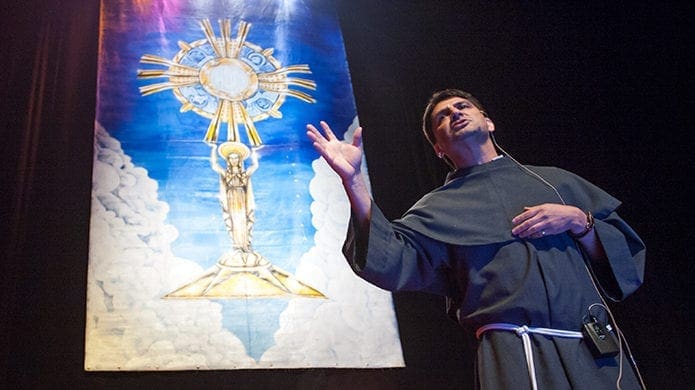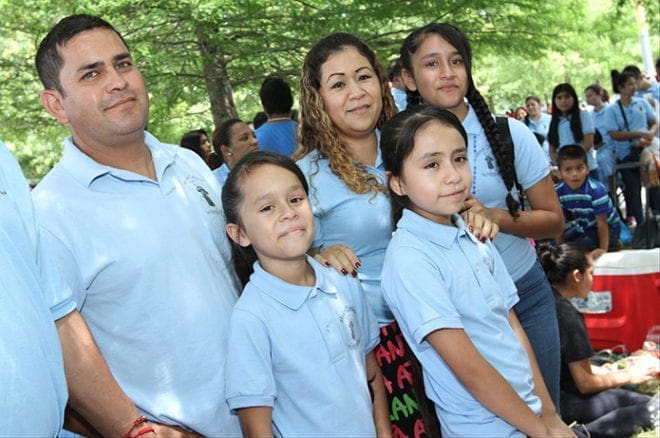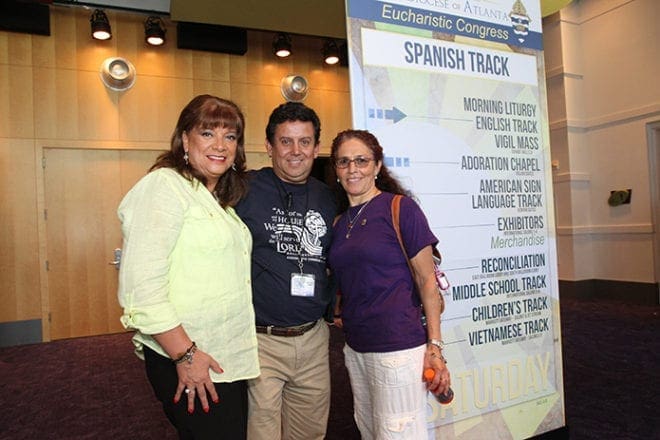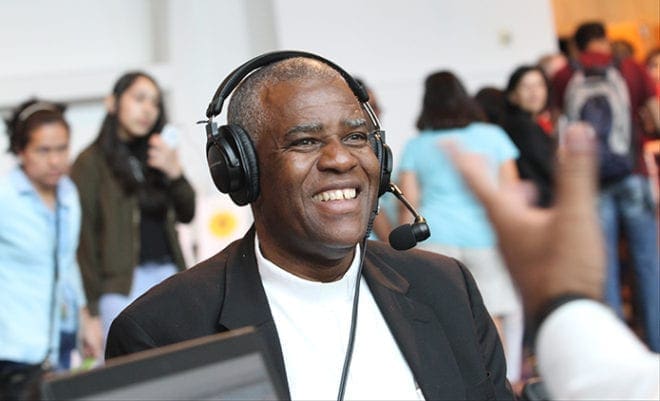 Photo by Thomas Spink
Photo by Thomas SpinkCollege Park
Dancing, singing, fervent prayers are hallmarks of Spanish track at congress
By DANIELA MORENO, Special to the Bulletin | Published June 23, 2017 | En Español
COLLEGE PARK—Thousands of Catholics from throughout Georgia gathered once again at the Georgia International Convention Center June 17 to celebrate the 2017 Eucharistic Congress.

This year’s Eucharistic Congress theme from the Book of Joshua, “As for me and my house, we will serve the Lord,” placed emphasis on families of faith like this one from San Felipe de Jesús Mission in Forest Park. Photo By Michael Alexander
As it does every year, Saturday morning started with the colorful, enthusiastic and faith-filled procession where participants sing, dance and worship with devotion before the presence of Jesus in the Blessed Sacrament. Airplanes from Hartsfield-Jackson Atlanta International Airport only a few minutes away fly so low that their sound becomes part of the musical procession; even those watching through Facebook Live can hear them roar.
By 10:30 a.m. the parking lot at the center was full and police directed people to park across the street. A family of five from St. Mark Church in Clarkesville walked across Camp Creek Parkway as quickly as possible. “We don’t want to be late for the Spanish track,” the mom said. The track started at 11 a.m.
Inside the cavernous building, air walls started to unfold to separate the Spanish track from the English track. A man from Prince of Peace Church in Flowery Branch, wearing a colorful indigenous native dress, proudly walked across the room with a smile on his face. Arturo Enriquez has been coming to the Eucharistic Congress with his parish and dance group for the last five years. They dance and praise the Lord during the procession and also during breaks throughout the day.
“We will continue to praise the Lord with our dance, and then we will be able to change into our regular clothing,” he said.
When the air walls closed in place, the stage was ready for members of the vibrant band “Sh3ma” from St. John Neumann Church, Lilburn. David Silva, founding member and father of two of the singers, said this is the sixth year they have provided music. The nearly full auditorium was set up this year to accommodate 10,000 people in the Spanish track, according to Jairo Martinez, director of the archdiocesan Office of Intercultural and Ethnic Diversity.
Symbols explain how faith works
There was a joyful atmosphere. Martinez welcomed everyone. “Dónde está la gente de la Misión de Santa Elena? Where are the people from St. Helena Mission?” he asked. As people cheered and clapped, he asked about other parishes and the audience responded. He then introduced master of ceremony Cucho García, a native of Puerto Rico who moved to Atlanta in 1982. As a husband of more than 40 years, a father and grandfather, García was able to emphasize the theme of the 22nd annual congress: “As for me and my house, we will serve the Lord” (Joshua 24:15).
The first speaker was Father Jacques E. Fabre, a member of the Missionaries of St. Charles Scalabrinians. Born in Haiti in 1955, he was ordained a priest on Oct. 25, 1986, in Brooklyn, New York. He is the administrator of San Felipe de Jesús Mission, Forest Park, where he has been serving since 2008. Father Fabre also is the spiritual director of the Hispanic Charismatic Renewal in Atlanta. Prior to ministering in this archdiocese, he served as a pastor in the Dominican Republic, as a chaplain to Haitian refugees in Guantanamo, Cuba, and in a parish in Florida.
“My first activity here in Georgia was the Eucharistic Congress,” he said with a sweet Spanish accent. He told the audience that he always uses symbols to explain his faith. Words are important, but symbols explain more easily how faith works, he said.
“Coconuts are very popular in the Caribbean. Well, we are like coconuts, with many layers to peel to get to the center. The last layer is the hardest to break, but once it’s broken, the water is delicious and the fruit so tender that you can make so many recipes with both the water and the fruit,” Father Fabre said.
He highlighted the importance of guiding the whole family to live their faith. He expressed how difficult it is nowadays to educate children in their faith.
“Do not let the TV, the media, or any electronic device educate your children. Take the time to teach your children all the good things God has created for all of us. Do not hide your children’s mistakes from others, and always make sure they know what you expect from them,” he said.
“Once we peel all those layers that represent our weaknesses, fears, anger, we will be able to enjoy the wonderful and true self of our hearts and souls, and you parents, as leaders of your families, will be able to say as Joshua said: ‘As for me and my house, we will serve the Lord.’”
During a break, while the music played, some people started to dance and sing, while others went to look at exhibits or stopped to eat. Estela Novoa ate a sandwich and explained why she comes to the congress.
“I have been a parishioner at St. Joseph, Marietta, for over 12 years, and this is a great opportunity for us to come together as one big family to celebrate our faith,” she said. She kept eating, and then suddenly jumped out of her chair saying, “Father Calixto is about to start, let’s go.”
Bolivian priest advises to put God first, without fear
Born in Bolivia, Conventual Franciscan Father Calixto Salvatierra completed his studies at the Catholic University of San Pablo in the city of Cochabamba. He made his sacred vows in 2002 and was ordained to the priesthood in 2004. He has served at Holy Cross Church, Atlanta, and is currently at Our Lady of Mercy Church in Winston-Salem, North Carolina.
Father Salvatierra is very active in ecumenical work and interreligious dialogue. He has directed and spoken at forums and symposia on these topics and served as official representative for several pontifical councils for the promotion of Christian unity.

(L-r) Ana Culverhouse of St. Brigid Church, Johns Creek, and Miguel Zumaran and Damiana Campos of Holy Cross Church, Atlanta, were among the thousands of participants on hand for the Spanish track. Photo By Michael Alexander
He started his speech talking about how he became a priest, how he felt when he heard the call to serve and how his life has changed since then. He then talked about family and how obedience brings blessings to humanity and how disobedience brings pain and suffering. For Father Salvatierra, people are disobedient when they crave material things they don’t need; when they want to be successful without making an effort; when they believe their way of thinking and living is the best way; when they go to Mass, but they do not listen to anyone, not even God.
He said, “The enemy, supported by all the paraphernalia out there, tells us that it is boring to go to Mass, that there are so many other important things to do on a Sunday. The enemy knows that if you obey God’s word, there is no room for fear, lies or infidelity.”
“The enemy wants you to believe that it is ridiculous to cry in happiness, that it is ridiculous to feel that God has made you free of the mundaneness of today’s material needs,” he said. But, in fact, it is “ridiculous is to think that by accumulating things you can be happy.”
He concluded by saying, “Let’s make a trending topic of those brave heroes that make a difference by always putting God first, with no hesitation, with no fear about what others may think of them. Let’s all do God’s will for the wellness of our communities.”
The next speaker, Fernanda Gómez, came up on the stage with her husband, Evan Lemoine (also a speaker) and their two children, which made the theme of the congress even more powerful. She offers guidance in the field of love and sexuality to young people. She is trained in theology of the body and natural family planning and is an instructor in the Creighton model of fertility care.
Her speech was about love as a process, a journey toward perfection and maturity of that love. She compared it to the learning process of a baby.
“As babies we are first held, then we start crawling, then we start making a few steps, we fall, we get up again, then we walk, then we run, and some even jump and do pirouettes in the air. But it is a process; it takes time and effort to evolve. Do you want to be held or do you want to jump in the air?”
‘We are a communion of love’
For Gómez, every day is an opportunity to grow in love, and the only way to achieve that perfection is “staying connected to God, plugged in to God, because God is the main source of love.”
She spoke of personal experiences, situations where she was disconnected and how that affected her marriage.
“If we get disconnected from our source of love, which is God, fear enters into our hearts and trust turns into shame. But if we stay connected to God, every time we make a new step, every effort we make to achieve perfection in love, fear goes away and trust remains the same.”
Evan Lemoine holds a master’s degree in humanities from the Anahuac University, Mexico, and a master’s degree in family sciences from the Pontificio Instituto Juan Pablo II in Mexico City. He also is trained in theology of the body, love and responsibility, and the philosophy of St. John Paul II. He is co-founder of the Amar al Máximo Institute with his wife, Fernanda, and is a recognized international speaker on theology of the body, sexuality, courtship and marriage.
Lemoine mentioned St. John Paul II several times during his presentation since the theology of the body, an analysis of human sexuality, constituted the first major teaching of his pontificate. He reminded the audience that sex is an act of donation, an act of giving, and a way to tell each other, “I belong to you.”
“We are a communion of love. You were created to donate yourself to another person in order to create another person and to be united forever,” he said. “We are called to live an intimate love with Jesus Christ, and the sacrament of marriage is vital.”
His perfect Spanish and outgoing personality made the audience laugh often, especially men.
“Don’t be afraid to say Jesus Christ is the only one that can truly make you happy,” he said, “because Jesus wants to be our true love and we should look forward to that communion with Christ through the Eucharist.”
At 4 p.m., the Blessed Sacrament was brought into the hall by Bishop Luis R. Zarama, who had the important job of concluding the Spanish track.
He started by saying that the morning procession perfectly reflected the Hispanic community in this church.
“Why are we here today? Maybe because it is a tradition, maybe because your girlfriend or your boyfriend invited you and you want to let her or him think you are a very religious person,” he said, making people laugh. “But whatever the reason, the truth is that when we come here, we feel safe, we feel secure, we do not feel alone.” He highlighted what is obvious: the Spanish track gets larger and larger every year, and the space won’t be large enough to hold all the people if it continues to grow at this rate.
He invited people to follow two pieces of advice given by Cardinal Joseph W. Tobin that morning, who said it is never too late to have a happy childhood because Jesus tells us to become like little children to enter the kingdom.
Bishop Zarama shares his personal message of love
“It is never too late to be like kids again so we can be surprised with all the marvelous things God has to offer,” Bishop Zarama said. “And it is never too late to love again. Love is what gives life that seasoning.”
His message continued by recognizing the many obstacles and difficulties in today’s world, but also reminding the audience that these obstacles can’t take away their hope, their dignity, their capacity to be surprised by all the good things that still happen during difficult times.
At this point Bishop Zarama started becoming very emotional, his words came alive and his voice cracked.
“You have made me become a Guadalupano,” he said, one devoted to Our Lady of Guadalupe. “Never feel ashamed of your heritage, of your roots, your traditions and your culture. Feel proud of yourselves, feel proud of your Latin heritage. Always look up.”

Father Jacques Fabre, administrator of San Felipe de Jesús Mission in Forest Park, was the leadoff speaker in the Spanish language track, but here he sits for an interview with Radio Inmaculada’s Genry Batista. Photo By Michael Alexander
The audience stood up and clapped and cried with emotion. Then he asked the men, “Men, raise your hands, when was the last time you cried? God doesn’t ask us to be macho but to share our love. Never be afraid of crying, hugging, kissing, saying I love you, because when you do so you will feel good because you are being yourself.”
“Ladies, love and listen. Let others speak, and listen, and do like Mary did. Keep those words in your hearts and think about them. And later, you will have the wisdom to say or do something that will change the hearts of others.”
“Young people, use your rebellious character for good things. Feel proud you are bilinguals, that you have Hispanic blood. Never forget who you are, where you come from, and feel comfortable about it. Never bow your head to anyone, and don’t feel bad because you are called Hispanic. Don’t feel less than anyone else. Feel proud of your traditions, your language, your families, and never hide them, because if you hide your roots, you hide yourself.”
“Love is here with us today because he loves us just the way we are,” the bishop said. “Remember, it is never too late to be kids. It is never too late to love again. … Que viva la Virgen de Guadalupe!”